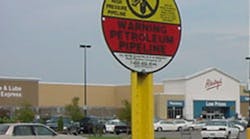Randy Jones, 44, a former corrosion coordinator for Shell Pipeline Co. LP (Shell), pleaded guilty in Milwaukee earlier this month to failing to conduct bi-monthly voltage readings and an annual survey of a pipeline used to transport jet fuel in violation of the Pipeline Safety Act (PSA) and making a false statement to the Pipeline and Hazardous Material Safety Administration (PHMSA).
Jones, a resident of Louisiana, pleaded guilty to knowingly failing to conduct required safety test between January and December 2011 and submitting false data to PHMSA. The violations were in connection with a pipeline owned by Shell that delivered commercial aviation jet fuel to General Mitchell International Airport in Milwaukee.
In January 2012 a hole was discovered in the pipeline at Mitchell Airport after jet fuel began showing up in soil surrounding the airport and in nearby Wilson Creek. Fuel eventually reached and melted asphalt on airport property. Shell reported that approximately 9,000 gallons of jet fuel was released. The response and cleanup cost for the spill was approximately $19.3 million.
Jones was employed by Shell from 1992 through 2012. From 2010 until 2012, Jones was employed as a corrosion coordinator and was responsible for monitoring the Shell pipelines servicing Mitchell and Chicago O’Hare airports. Jones failed to conduct the required testing for 2011 and when advised of an audit by PHMSA that was scheduled for December 2011, he submitted false data indicating the required test had been conducted.
Consistent with requirements of the PSA, which establishes standards for the safe operation of the hazardous materials in pipelines, buried or submerged metal pipelines must be protected to prevent corrosion. This involves the use of a device called a rectifier, which applies a negative current to soil near the pipeline to keep corrosion away from the pipe. The operator of the pipeline is required to conduct bi-monthly readings of the voltage generated from a rectifier and conduct an annual survey of the pipeline to insure that the pipeline is adequately protected from corrosion. PHMSA is the primary agency responsible for regulating and enforcing the PSA.
An information charging Jones with two counts of violating the PSA and one false statement violation was filed on Nov. 14, 2014. Under the terms of the plea agreement, each offense charged carries a maximum prison sentence of five years. The sentencing is set for April 30.
The case was investigated by EPA’s Criminal Investigation Division, the U.S. Coast Guard Investigative Service, the U.S. Department of Transportation Office of Inspector General and the FBI, with assistance from PHMSA. The case was prosecuted by Jennifer A. Whitfield of the Environmental Crimes Section of the Department of Justice and Tracy M. Johnson of the U.S. Attorney’s Office for the Eastern District of Wisconsin.


